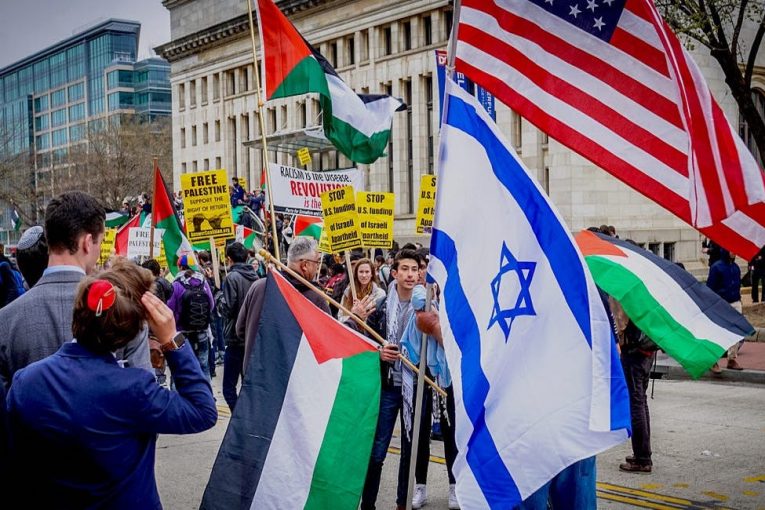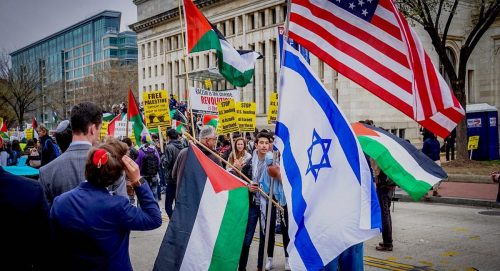

Creator: Ted Eytan
Copyright: Ted Eytan
https://ethnicmediaservices.org/spotlight-ethnic-media/ethnic-media-coverage-widens-news-lens-on-israel-palestine-war/
By Kimberly Bajarias
The following piece was submitted through the Vanguard’s Berkeley Student Publication and represents the views of the author and not necessarily that of the Vanguard and its editorial staff. The Vanguard invites robust but respectful dialogue on this and all topics. Alternative views can be submitted to: info@davisvanguard.org.
GAZA, PALESTINE – Since 1948, the state of Israel has imposed imperialist practices upon the people of Palestine, leaving scars and still-bleeding wounds upon their land and people. Historically, and extending into the present, the Israeli-Palestinian conflict has called for ally communities to step forward and support Palestine’s liberation and self-determination on their own land.
This conflict is one of settler colonialism and land rights, violence and discrimination, self-determination and human rights, and if Israel continues to inflict unnecessary violence upon what remains of Palestine, what will be left?
Throughout this, the area commonly referred to as the “Middle East and North Africa (MENA)” will instead be referred to as “Southwest Asia and North Africa (SWANA),” to remove the Eurocentric lens from which it emerged, and to represent its accurate geography.
History of the Israeli-Palestinian Conflict:
In the era of World War I, the British government issued the Balfour Declaration in 1917, calling for and supporting the establishment of a national home for the Jewish people. Excluding Palestinians from the conversation, the British adopted policies that would lead to Jewish immigration onto Palestinian land for decades.
As World War II crept on, the persecution of Jewish refugees — along with a desire to establish a permanent home for Jewish people — led to their immigration into Palestine. After World War II, violence erupted between the Jewish population and the local Arab population, eventually ending in Israel’s declaration of independence in 1948, and the acquisition of 77% of Palestinian territory.
During the Arab-Israeli war, “more than 700,000 Palestinians were forced to flee and approximately 15,000 were killed,” a period of time that Palestinians now refer to as the “Nakba,” Arabic for “catastrophe.”
Since the illegal Occupation of Palestinian land, the Israeli state’s settler colonialism and oppressive practices have amounted to further restriction and violence. The offensives in 2023 have been called a “second Nakba.”
The Israeli-Palestinian Conflict Today:
The Gaza Strip — the epicenter of the Israeli-Palestinian conflict and essentially the last remaining home for Palestinians — is often referred to as the “world’s largest open-air prison.” Treatment as second and third-class citizens on their own land, inaccessibility to resources, restriction on speech and movement, military presence, along with other oppressive tactics, have made life for Palestinians in Gaza a humanitarian crisis.
In 2021, there were more than 700 checkpoints and roadblocks to “deliberately control and restrict Palestinian movement” across the occupied West Bank. Palestine’s restriction on movement is also manifested by a large concrete wall, removing access to fertile land, social services, etc. from the people. Both the checkpoints and wall are examples of Israel’s blockades on Palestinian movement.
According to Bears for Palestine, a student organization at UC Berkeley, “this wall is also used to illegally annex land into Israel, a violation of International Law. Much of this land is actually farmland, which prevents Palestinians from reaching arable land that they need to cultivate to produce food for the region.”
Israel’s use of collective punishment and white phosphorus are additional violations of International Law. The government continues to launch attacks and airstrikes on Gaza, claiming that it will continue this collective punishment until the governing militant group of Palestine — Hamas — surrenders. Israel has also used white phosphorus in this civilian punishment, severely burning those exposed to it.
The area of Gaza remains largely under-resourced, while those in Israel have relatively enjoyed their own freedom of movement and abundance of military, financial, and economic resources.
In response to these histories, on Oct. 7, 2023, Hamas conducted an attack on Israel. In response, the state of Israel launched brutal attacks on the remaining community of Palestine in Gaza, a series of which has endlessly and mercilessly targeted civilians. More than 700 innocent children have been murdered as a result of Israel’s strikes.
Immediately following the attack from Hamas, the state of Israel cut off access to water, fuel, and electricity for those in Gaza. Those in Gaza now face the grave question of whether or not they have the basic resources to take care of themselves and their families.
Among many direct and violent attacks on Palestine, Israel conducted a catastrophic strike on a refugee camp without warning on Oct. 31, 2023. Israel “has taken responsibility for the strike at the Jabaliya [sic] refugee camp, which is one of the most densely populated areas in the Gaza Strip,” leaving “‘holes in the ground, full of killed people, body parts all over the place.’” The number of victims from the Jabalia refugee camp are still being finalized, but more than 50 people have been killed and counted only a few hours following the attack.
Palestinian-Asian Solidarity:
In consideration of the history of illegal occupation and violence, communities across the world have demonstrated their support for Palestinians. In a commitment to uplift those who have been oppressed, organizations in the Asian community have expressed their solidarity with the people of Palestine.
When the Association for Asian American Studies (AAAS) passed the Resolution to Support the Boycott of Israeli Academic Institutions in 2013, they became the “first academic organization in the United States to pass a resolution in support of the boycott of Israeli academic institutions.” In targeting Israeli academic institutions, AAAS condemned the illegal occupation of Palestinian land.
Furthermore, the resolution pushed forward three goals: 1) teaching campus communities on the realities for Palestinians living under Israeli rule, 2) discouraging campuses from partnerships with Israeli academic institutions, and 3) forging alliances with Palestinian academics and students.
With the movement of “Free Palestine” protests surging across the world, communities within Asian countries like Indonesia and Japan have come together, calling for the freedom of Palestine from Israel.
In addition to contemporary demonstrations of solidarity, Asian countries have illustrated their recognition of Palestine’s oppression throughout history.
The Bandung Conference of 1955 was “the first intercontinental conference of colored peoples in the history of mankind” and was also considered “the first time the rights of Palestinians were acknowledged at an international level.” At this time, Palestine could not send an official envoy.
Considering this, China made important efforts to “include Palestinian hardships in the shared Asian-African experiences of foreign domination and political aims of self-determination” and noted the lack of thoroughness without Palestine’s representation in the Conference.
In 1973, Japan’s chief cabinet secretary Susumu Nikaido announced a Japanese policy that articulated the country’s position on the Israeli-Palestinian conflict: endorsing the Palestinians’ right to self-determination, calling for the withdrawal of Israeli forces from occupied territories, and warning Israel of their stance reconsideration. And in 2023, Japan was the only country of the G7 to express “concern over the number of casualties in the Gaza Strip caused by the Israel Defense Forces in their militarized response.”
This is not to say that Japan does not have economic or other interests in their stance, but rather to demonstrate the value of solidarity with Palestinians.
In addition, community organizations like the Asian Forum for Human Rights and Development (FORUM-SIA), Human Rights in China, and International Women’s Rights Action Watch Pacific have consistently stood against the Israeli occupying forces (IOF) repressing Palestinian freedom of expression and conducting raids. In these 2022 raids, the IOF “confiscated documents and equipment and destroyed items in the offices,” and closed Palestinian organizations who dared “to seek accountability for Israel’s grave human rights violations, war crimes, and crimes against humanity.”
Popular social media platforms, like Instagram and TikTok, have been important spaces for Palestinians to highlight the realities in Gaza, and for allies to voice their support. On TikTok, @jaehan9192 posted a video of a public demonstration held in South Korea, where citizens gathered and marched through the streets, chanting “Free Free Palestine” and “Gaza Gaza don’t you cry, we will never let you die.”
According to Bears for Palestine, solidarity is vital at this time: “In the face of consistent propaganda and false narratives produced by the Israeli Apartheid State, international solidarity is what keeps the Palestinian Liberation movement strong. Our main weapon to assist the movement outside of Palestine is by using our voices to show the world the truth of this settler-colonial occupation. Because of this, we sincerely thank all of our solidarity groups for amplifying our voices in this struggle for a liberated and free Palestine.”
As the conflict between Israel and Palestine continues to surge, and as violence continues to tear the lives and families of Palestinians apart, it is more important than ever for people across the world to speak out against their oppression. Otherwise, what will be left of Palestine? What will be left of their people?
Kimberly Bajarias is a writer for the Vanguard at Berkeley’s Social Justice Desk.
Hamas started this, killing 1400 unarmed innocent Israeli citizens including reportedly 40 babies. Hamas has vowed to keep it up until all Israelis are destroyed. The Palestinians voted Hamas into power and danced in the streets after the massacre. They can’t be too surprised that now Israel would go after and try to eliminate Hamas.
Israel doesn’t give a hoot about innocent Palestinian civilian lives in Gaza and the West Bank including scores of babies.
More than 3,900 Palestinian children have been killed in four weeks, or roughly 40% of people who have died in Gaza as a result of Israeli strikes, according to the Hamas-controlled Gaza health authorities. On Saturday, Gaza health officials said another 1,200 children are missing and their bodies are believed to be buried under rubble.
Wall Street Journal, 11/4/23
More Israeli violence and killing being perpetrated against non-terrorist innocent Palestinian civilians.